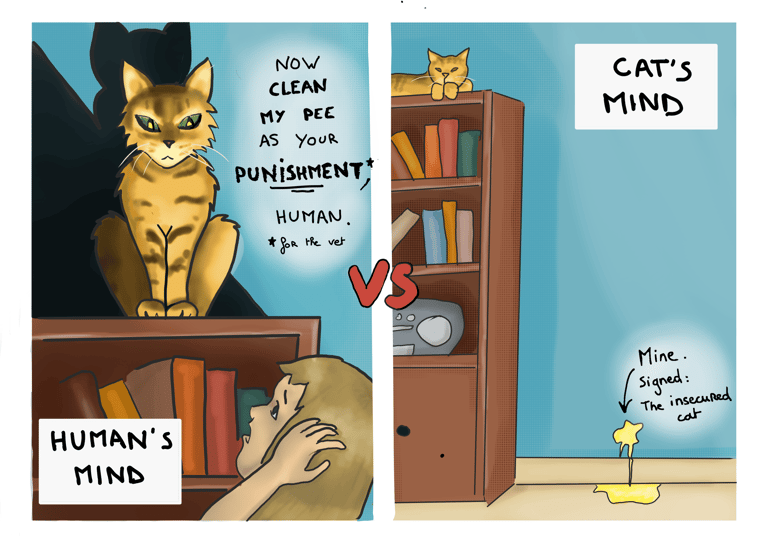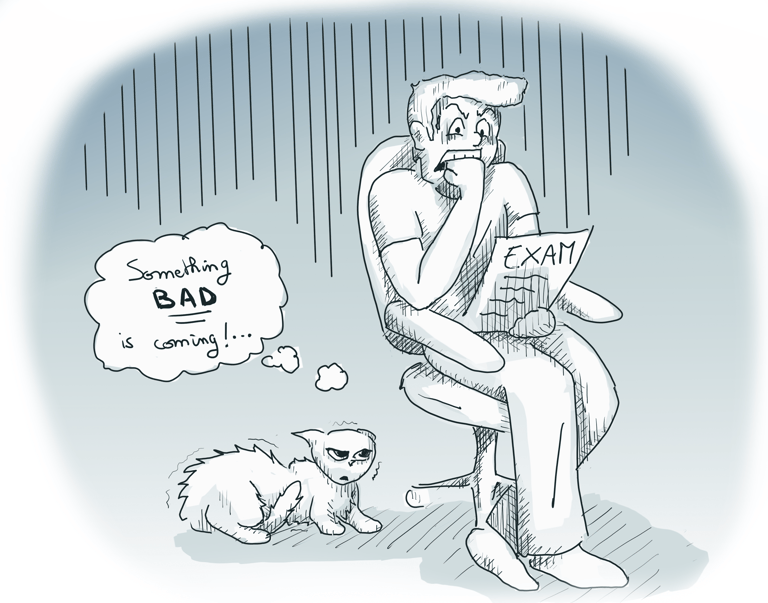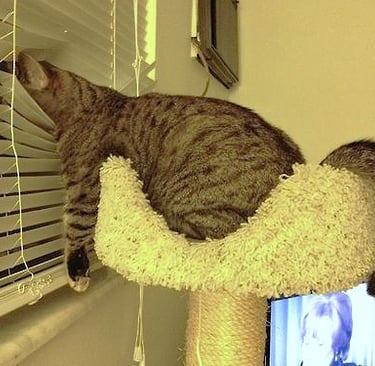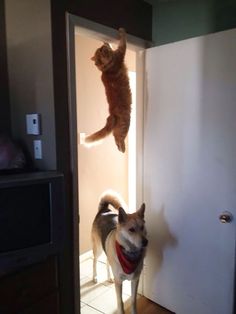Why does my cat urinate out of the litter box?
Multiple reasons can trigger this pretty annoying behaviour. Let's go over them...
Marlène Laurent Cat behaviourist
6/25/20247 min read


A cat urinating outside the litter box isn't punishing you nor taking any kind of revenge! Revenge, ressentment or punishment are human concepts, they are your own feelings projections, also called anthropomorphism. Do not let internet fool you: nothing proves scientifically that cats are trying to take on humanity and make us their slaves. Cats are far from these kind of thinking, this behaviour is just their best response, in the spectrum of available options , to a problem they face and which is stressing them. Punishing or grounding the cat in return would not only be unfair, it would be conter-productive. You would only add to the existing stress and worsen the problem, your cat would only learn one thing: to fear you...


Let's start with what it isn't:
The first cause you want to consider is the health issue, even if your cats keeps on playing/eating. Cats are not only predators, they are also preys: they instinctively hide pains and diseases that make them vulnerable. Cats' inappropriate elimination must be taken seriously because urinary and kidney issues are pretty common. Moreover, If your cat has or had pain during peeing, it can associate the litter box to the bad experience, and avoid it. Then, adding to the health problems waiting may causes, it can be very difficult to convince your cat to go back in the litter box, even if the pain is now gone. Trust me, this is a gamble you don't want to make...
A Health issue:
The second possible cause is a litter box aversion: your cat doesn't like its litter box and found better place to eliminate. Cats communicate with smells and partly by urinating or defecating: the litter box is the first scent marker in the home. Lots of factors are taken into account in your cat's choice: first off all its location, its scent soaking abilities, its size, its substrate, its safeness (possibility to see around and several fleeing options), its peacefullness, how it is cleaned, smells around, etc. Critereas are numerous and can some can differs from a cat to another one, depending on its experience, personality and preferences.
An inappropriate litter box:
Since urine marking seems to be important in reproductive behaviour, a non-neutered cat would be more likely to mark that a sterilized cat. This is especially true for males. Cats that have been sterilized before puberty and have less chances to show house soiling issues later. I can't stress it enough: get your cat neutered. Not only for house soiling issues: neutering raises in average the cats's lifetime, limiting roaming and male fights and so, car kills and VIF transmission for males, lowering by 7 risks of mammal cancers, avoiding estrus and its big hormonal swings for females, unwanted gestations and by extension, shelter cats euthanasia who could have been adopted instead of the kittens you will give.
Your cat hasn't been neutered:
...and your cat has enough of it: it is the last straw that broke the camel's back! Stress has usually several causes and aggravating factors, depending on the cat's personnality, experiences and environment... One study shows that cat house soiling is linked to the cat self-confidence and a fearfull cat is more likely to pee outside his litter box. Trying to generalize and categorize sources of stress is kind of absurd since life is more complicated than little boxes. Nethertheless, here are some likely causes of stress in house soiling:
A new stress entered the room...
- A (too?) crowded living area : the more numerous we are, the more crucial it is to communicate, especially when ressources sharing is involved. Well, our cats are no different except they communicate via scents. Cats living under the same roof and neighboor cats increases the necessity for cats to leave messages and therefore, to urine mark. Cats have a facultative sociality. I stress the "facultative" term: a good portion of cats don't actually like forced cohabitation. Cats that were used to live alone and have never been properly socialized to or had bad experiences with other cats probably won't bear well with sharing their ressources. Adopting a new cat would then be more a stress factor than a life enrichment.


- On the other hand, loneliness, under-stimulation and boredom also are stress factors. Exploration is an essential cat need, leaving him alone in a static environment all day long can be a sort of abuse. Have you been out a lot lately? Do you spend enough time in general with your cat ? Is his environment rich enough? Can he access new things to explore? All are good questions when your cat starts peeing outside the litter box.
- An environmental stress: a too pressing dog, a limited/unpredictable access to ressources (ex: limited food, limited access to outside), sensory pollution (ex: loud music, ambiance perfumes), etc. The majority of the cat's senses is sharper than ours, it can be tricky to identify a source of environmental stress for a cat since it can be insignificant for us.
- Old age: average domestic cats longevity is around 15 years, a cat is considered senior after 10-11 years. It can be hard to hear, but maybe your cat is getting old. First signs of senility can explain a new stress and house soiling. Or maybe arthrosis makes the access to the litter box more difficult and it is time to propose a more adapted litter box with no or smaller edges.
- A social stress: conflicts, a lack of autonomy, misintrepretation or irrespect of cats communication signals (unwanted pets, defensive play, overwhelming kids) can puch you cat to want to communicate 'louder'. That is why, since we are unable to interpret smells, humans need to learn how to recognize and to respect visual or vocal cat's signals.
- A change is coming (and believe me, your cat noticed) or is happening in the household: a moving, a renovation, an adoption, the arrival of a baby, a divorce etc. You feline buddy is loosing its references and feels the need to reclaim control by marking. If you plan a big change, a preventive consultation can be usefull to prevent unwanted behaviours and soften the transition if your cat isn't a secured cat.


- A mirroring stress: and you, do you feel stressed out lately? Cats are very perceptive, and would soak on your emotions: by observing you, they get that your are stressed and it's contagious. From your cats point of view, if you are stressed out, it means there is danger.
- etc.


Of course, the list of causes are far from being comprehensive, there is usually more than one cause to this complex issue. One thing is sure: since cats are habbits creatures, you want to act to correct the behaviour quickly. Because if the behaviour settle in, it can become very difficult to solve entirely later on. For that, after checking for medical issue with your vet, you can consult a cat behaviourist for a personalized analysis and program.
This is one of the most common reasons of cat behavior consult and no wonder, it is extremely annoying to find cat pee everywhere at home! The smell is hard to clean up (well, olfactive messages are meant to last...), and cat urine leaves discoloration stains. But you installed a litter box so why on earth is your cat not peeing in it (anymore?)?
To get a beginning of answer, ask yourself what the other elimination location have that the litter box doesnt. Is it closer to an access or in a living area? Is is softer, more opened? One thing to keep in mind : cats often prefers the kind of litter box they were using as a kitten in the first months of their life. Know that cats can use an inappropriate litter box for years, until one new stress overstreps its tolerance limits and triggers house soiling (or other annoying behaviour). That's why litter choices are so decisive in cats' well-being and why it is important to offer an appropriate litter box form the beginning.
Before the house soiling, other pre-signs can warn you that something is probably wrong:
-a cat who speeds out of the litter box right after eliminating,
-shows signs of stress right after leaving the litter box (such as ears held back or sideways, frantic licking or scratching, aggressive behaviours etc.),
-hesitates and takes a lot of time to use the litter box,
-doesn't cover up anymore or behaves like covering but outside of the litter box
etc.


Sources:
Mikkola S, and al. Feline litter box issues associate with cat personality, breed, and age at sterilization. J Am Vet Med Assoc. 2023 Feb 24;261(5):652-660. doi: 10.2460/javma.22.10.0441. PMID: 36840938.
Neilson JC. Thinking outside the box: feline elimination. Journal of Feline Medicine and Surgery (2004) 6,5–11. doi:10.1016/j.jfms.2003.09.008
Neilson JC. Feline house soiling: elimination and marking behaviors. Clin Tech Small Anim Pract. 2004;19(4):216–224. doi:10.1053/j.ctsap.2004.10.003
Omeran Bedour M, and al. Ovariectomy versus Ovariohysterectomy for Elective Sterilization of Female Cats. Alexandria J of Vet Science. 2014 Vol 43, Issue 1, p73. doi :10.5455/ajvs.171211
Yates, D., & Leedham, R. (2019). Prepubertal neutering in cats and dogs. In Practice, 41(7), 285–298. doi:10.1136/inp.l5007












